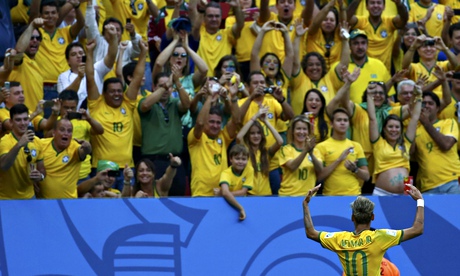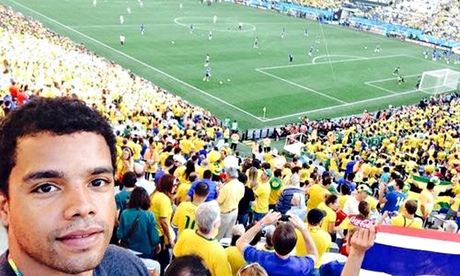The World Cup was supposed to show Brazil's cultural diversity. All it's really exposed is the country's deep-rooted prejudices

Brazil's Neymar gestures to the crowd after scoring against Cameroon during their World Cup group game. Photograph: Michael Dalder/Reuters
Remember the Where's Wally books? They consisted of a series of detailed double-page spread illustrations depicting hundreds of people doing a variety of amusing things. Readers were then challenged to find a character named Wally hidden in the crowd.
Covering the World Cup in Brazil as a journalist, I find myself playing a similar game whenever I enter a packed stadium, only this time the question is a bit more serious. Where are all the black folk? I've been to five host cities so far and each time the answer was never easy to come by – I've even missed goals while looking through the crowd.
Salvador is the most Afrocentric city in Brazil. At the Germany v Portugal game, however, if I didn't know any better I would think I was in Kansas.
In São Paulo, Fortaleza, Rio de Janeiro, Recife, the same thing. Where have all the black people gone? This in a country with the biggest population of African descent outside of Africa. Brazil is sold internationally as a rainbow nation, as close to a racial democracy as any country can get. To some degree it's true; for all its sheer size and diversity there are no ethnic or religious conflicts and everyone speaks the same language. Socially, though, it's a different story. The government hoped to use the World Cup to showcase the country's cultural diversity and thriving democracy in all its splendour, but all it did was to highlight the deep-rooted prejudices and inequalities in this nation of 200 million.
So, in a piece of land where 60% of the population is black or mixed, why then, during one of the most important single events in its history, is the absence of those 60% so conspicuous?
The answer is as obvious as it is tragic. Most black people in Brazil are poor. Unlike in South Africa or the United States, there's no black middle class, and perhaps most importantly there isn't a black political class. A World Cup ticket is officially priced between $90 and $1,000, but in a country where the minimum wage is a little above $350 a month, a seat at the Maracanã is out of many people's reach.
 Felipe Araujo covering the World Cup for German broadcaster ZDF. 'In a land where 60% of the population is black or mixed, why, during one of the most important events in its history, is the absence of those 60% so conspicuous?'
Felipe Araujo covering the World Cup for German broadcaster ZDF. 'In a land where 60% of the population is black or mixed, why, during one of the most important events in its history, is the absence of those 60% so conspicuous?'
In Fortaleza, for Germany v Ghana, there were obviously more black people than usual in the stands – but apart from the Ghanaians, the only black people anywhere near the stadium were the poor residents from the nearby favela, selling drinks and snacks to white middle-class fans, who couldn't be bothered with the long queues inside the arena. Or for those who didn't feel like walking the 3km imposed by Fifa from the road blocks to the stadium, there were throngs of poor, black, favela kids ready to take the fans on their bikes.
Brazilians have always had a peculiar attitude towards race. This was the country's football superstar, Neymar, four years ago, when asked if he had ever been a victim of racism. "Never. Neither inside nor outside the field. Because I'm not black, right?"
The players of the national team are clearly mostly black or mixed race (including Neymar): many though, dye their hair blond (including Neymar). Other Brazilian sporting heroes have equally dismissed the issue of race in the past. Ronaldo has also denied his black heritage, and the country's biggest football icon, Pele, is too busy doing commercials to say anything meaningful on the issue.
In 1888 slavery was officially abolished in Brazil – the last country in the western hemisphere to do so. Fast forward to 2012 and it enacted one of the world's most sweeping affirmative action laws, requiring public universities to reserve half of their admission spots for the largely poor students in the nation's public schools and vastly increase the number of university students of African descent across the country. Brazilian officials said at the time that the law signified an important shift in Brazil's view on offering opportunities to large swaths of the population.
However, for all the things this World Cup has provided, opportunities for its black population isn't one of them. On this particular issue Brazil has scored an own goal.
